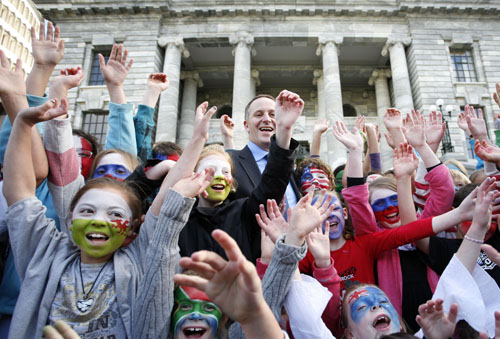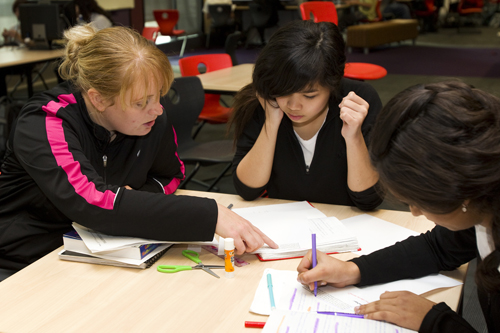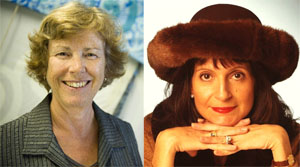
Prime Minister John Key and young New Zealanders celebrate 100 Days to Go to Rugby World Cup 2011. (Photo courtesy of RWCNZ 2011)
New Zealand's "Stadium of Four Million" is ready to host the 2011 Rugby World Cup on September 9. In its world cup bid for the championship, this unique multi-cultural nation (with the most highly ranked rugby team in the world) promised to provide optimum world class rugby facilities where players would be inspired to perform at their very best. New Zealand also promised to create an environment where players and fans would be safe and welcomed.
So how does a country which values its sports so highly support and nurture its younger fans and players in their equally important educational paths? It should be noted that New Zealand ranks much higher than the US in the global standardized PISA test (7th in both Science and Reading and 13th in Math). What is New Zealand's vision for its teachers, its students, its curriculum, and for learning?
I recently got the opportunity to discuss these important questions with Dr. Rosemary Hipkins, the distinguished Chief Researcher of New Zealand's Council for Educational Research.
What kind of educational system will permit a country to have the people skills needed to compete globally?
A system with a high trust/low stakes model of accountability. If you have a high stakes/low trust model of accountability, then you're in trouble before you begin because teachers won't feel safe enough to be innovative. If you don't believe that your teachers are professionals and can try things out in different ways, then you are never going to change anything. So I put a system with a high trust and low stakes model of accountability at the top of the list.
A system where curriculum and assessment policy are conveyed via flexible frameworks that leave space for local interpretation based on student learning needs. If you have the right model, it will leave space for teachers to interpret and use it based on their learners. The New Zealand Curriculum is a framework that applies some very high level principles that all schools are supposed to use. It specifies why each principle is important but it leaves it to schools to assemble the pieces as they believe they will work for their students. So there are a lot of different models. Each model should be implemented in conjunction with the whole school community so that everybody (parents/teachers/students) understands what the school is trying to achieve. Our secondary school system also has a flexible framework that I think is very unusual around the world. I don't think many people have been brave enough to do what we've done in New Zealand.
For an educational system to achieve, it has to involve the whole community. Parents need to understand why schooling is different from the time they were schooled.
And again, we need to believe that teachers are professionals and create the conditions that make it possible for teachers to work like professionals. For example, something we've been experimenting with in New Zealand is building professional learning networks for teachers, both inside schools and across schools. While this is not yet national (roughly about a third of our teachers in secondary schools are in the program), it's going very well. Another learning initiative we've undertaken in New Zealand is the Te Kotahitanga, which is a Maori phrase. The goal of this is to get teachers to listen to the voices of the Maori children to sense their learning needs better so as to understand what they need to do differently to accommodate their learning needs.
Another initiative that our government has resourced is a numeracy project that aims to strengthen the abilities of primary school teachers, particularly in schools in our low socioeconomic communities, which we've targeted first. The goal is to teach numeracy in a way that lays a strong foundation for all students. It's a problem solving approach, a measured approach of making students very aware of the strategies that they are using.

Teacher and Students at Albany Senior High School NZ (Photo courtesy ASHS NZ)
What is your view of standardized testing?
I think that if you can give teachers a powerful diagnostic tool to help them get positive insights into what a student's learning challenges might be, then actually you are handing them a very powerful enquiry tool. It depends on how the assessment tools are used. If you can use those tests in a high trust/low stakes model, then they might be valuable.
If generalization is possible, what elements are missing from the preponderance of the current systems?
There is a small group of people who talk about school learning being based on epistemology and forget the fact that school is also about shaping who children are and who they can become. Learning must focus on who students can be and become, not just on what they know and can do.
What is the state of emotional well being among New Zealand students?
Generally speaking, kids have been able to follow the study pathways they've wanted to in New Zealand. Maybe that's the luxury of having a small country where you don't have population pressures and ferocious competition. Obviously, if you want to get into a competitive entry course such as a medical school, then you've got to work really hard to do that, but there have always been other learning pathways for our students here. Perhaps we're a bit more laid back as a society - some people would say too much.
From a larger perspective, does your country's definition of educational excellence take into account the quality of life of individuals and of a society, including its artistic and cultural achievements?
The words that describe our overall vision for our students within our curriculum are confident, connected, actively involved lifelong learners. Students are encouraged to value excellence, innovation, curiosity, diversity, community, ecological sustainability, and integrity. Excellence is defined in a learning to learn framework, aiming high and persevering in the face of difficulties. One of the eight learning areas in our curriculum frames is a vibrant arts curriculum. One of the things that are unique about New Zealand is our Maori culture, and our location as a Pacific nation with people here from many different Pacific island communities. We feel that makes us unique and different to other parts of the world. Certainly in our schools, we see the need to be aware of this strong cultural diversity. We also believe the arts are powerful forms of expression that recognize value and contribute to the unique bi-cultural and multi-cultural character of New Zealand, enriching the lives of all New Zealanders.
World Wisdom from New Zealand
If you have a high stakes/low trust model of accountability, then your educational system is in trouble from the onset. Empower teachers to implement curriculum and assessment guidelines according to the needs of their students. The Arts are powerful forms of expression that contribute significant value. For an education system to succeed, it needs to involve the whole school community -- parents, teachers, and students.

Dr. Rose Hipkins and C. M. Rubin
